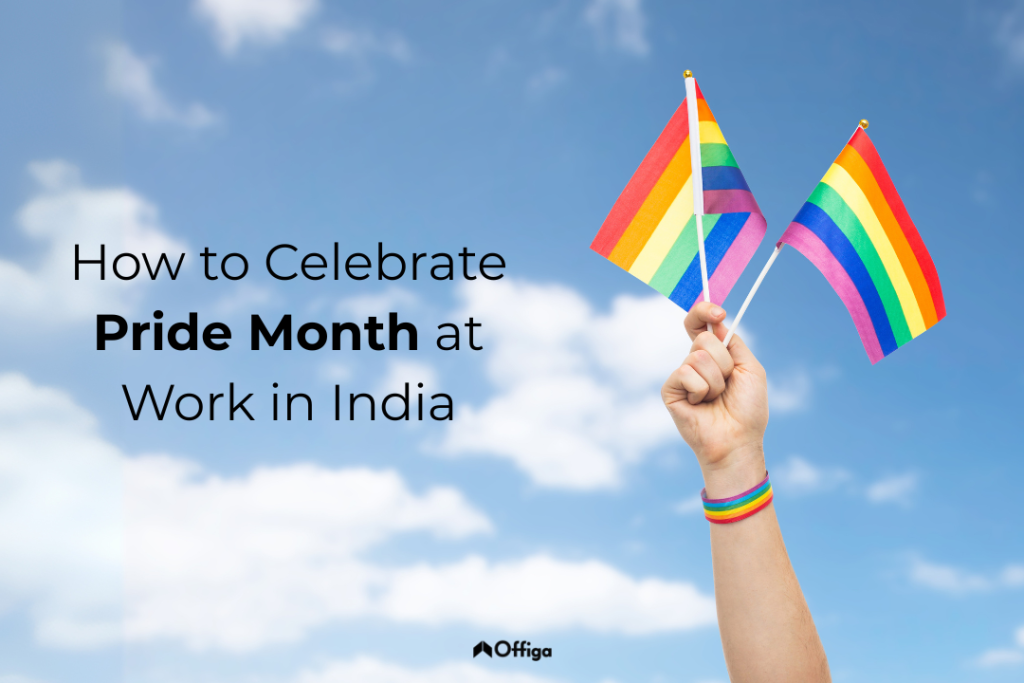With Pride Month here, Indian workplaces have a unique opportunity to demonstrate their commitment to diversity, equity, and inclusion. For HR managers and business leaders, this isn’t just about showing solidarity; it’s about fostering a truly inclusive environment that benefits everyone. But how to celebrate Pride Month at work meaningfully, moving beyond superficial gestures to impactful actions?
This comprehensive guide offers practical activities to celebrate Pride Month in office, specifically in the Indian context.
1. Foundation First: Educate & Sensitize Your Workforce
The most crucial step for any Pride Month celebration in office is education. Many employees may lack understanding of LGBTQ+ terminology, experiences, or the importance of Pride within the Indian context.
- Tailored Sensitivity Workshops: Partner with Indian DE&I consultants or local LGBTQ+ organizations to organized workshops focused topics such as understanding core LGBTQQ+ terminology, navigating unconscious bias and the business case for inclusion.
- “Ask Me Anything” (AMA) Sessions: Facilitate respectful AMAs with LGBTQ+ advocates or even employees (if they are comfortable and willing), to share lived perspectives and build empathy.

2. Visible Leadership & Championing Allyship
Authentic Pride Month celebrations in Indian companies require leadership buy-in and visible allyship that understands local sensitivities.
- CEO/Leadership Messages: Encourage senior leaders to issue genuine statements of support, underscoring the company’s commitment to LGBTQ+ inclusion in the Indian context. This sets the tone for your Pride Month activities for employees India.
- Empower Allies: Launch an “Ally Pledge” or provide digital badges for employees to display (e.g., email signatures). Offer resources on effective allyship that acknowledge specific challenges or questions allies might face in India.
- Spotlight Internal Stories: Feature LGBTQ+ employees in internal communications, sharing their journeys and contributions. This humanizes the experience and reinforces the message to celebrate Pride Month by celebrating them.
3. Engaging & Meaningful Activities for Pride Month Celebration in Office India
Move beyond passive observation with interactive and impactful activities for Pride Month celebration in office.
- Insightful Webinars & Panel Discussions: Host sessions with LGBTQ+ professionals, allies, or legal experts from India, discussing topics pertinent to the Indian corporate environment – e.g., “Navigating the Professional World as an LGBTQ+ Individual in India,” “Building Inclusive Teams in India,” or “Understanding the Evolving Landscape of LGBTQ+ Rights in India.”
- Interactive “Pride Wall” or Digital Storyboard: Create a physical or virtual space where employees can share messages of support, personal reflections, or express what inclusion signifies to them. This directly addresses “what to do for Pride Month at work in India” in a participatory way.
- Inclusive Book/Film Club: Suggest books or documentaries that explore LGBTQ+ themes and experiences, particularly those with an Indian narrative, followed by a facilitated discussion.
- Show Your Support with Pride Swag! Allow your employees to show their support for the LGBTQ+ community with one of our special Pride swag packs. Encourage your team to wear their pride swag to any Pride Month events they attend in the office or outside of work.

For more Pride Month activities and ideas, check out this article.
4. Review & Enhance Inclusive HR Policies for Indian Workplaces
Pride Month is the perfect time to conduct a thorough audit of your existing HR policies to ensure they are genuinely inclusive and compliant with current Indian legal frameworks for LGBTQ+ inclusive workplace initiatives.
- Policy Audit: Explicitly incorporate sexual orientation, gender identity, and gender expression into all non-discrimination, anti-harassment, and code of conduct policies, ensuring they are legally sound for India.
- Inclusive Benefits Review: Ask questions like-
-
- Are health insurance plans inclusive of same-sex partners and gender-affirming care?
- Do parental leave policies (e.g., for adoption, surrogacy) extend to same-sex couples, considering current legal interpretations in India?
- Do you have clear guidelines for preferred names and pronouns in official documents and HR systems, accommodating diverse gender identities?
- Robust Grievance Mechanisms: Establish confidential, accessible channels for reporting discrimination or harassment based on sexual orientation or gender identity, ensuring swift and fair resolution.
- Establish Employee Resource Groups (ERGs): Launch or strengthen LGBTQ+ ERGs or Ally Networks. These groups provide vital community, advocacy, and a voice for employees, by empowering your people and fostering a sense of belonging.
5. Beyond June: Long-Term Commitment to LGBTQ+ Inclusion in India
True inclusion is a continuous journey, not a one-month event. Your pride month activities should be part of a broader, sustained effort.
- Year-Round D&I Calendar: Integrate LGBTQ+ inclusion initiatives throughout the year, not just in June, ensuring consistent focus.
- Ongoing Learning: Implement continuous learning modules for all employees, especially new hires and managers, keeping them updated on evolving best practices and legal changes in India.
- Feedback & Iteration: Regularly solicit anonymous feedback from employees, particularly from the LGBTQ+ community in India, to understand their experiences and refine your DE&I strategies.
- Measure & Report: Track key diversity metrics (e.g., employee satisfaction, retention rates, representation in leadership) to understand the effectiveness and ROI of your LGBTQ+ inclusion efforts within your Indian operations.
By adopting these strategies, your workplace can move beyond symbolic gestures to truly celebrate Pride Month with employees by fostering a culture of genuine respect, belonging, and equity for every individual, every day.




